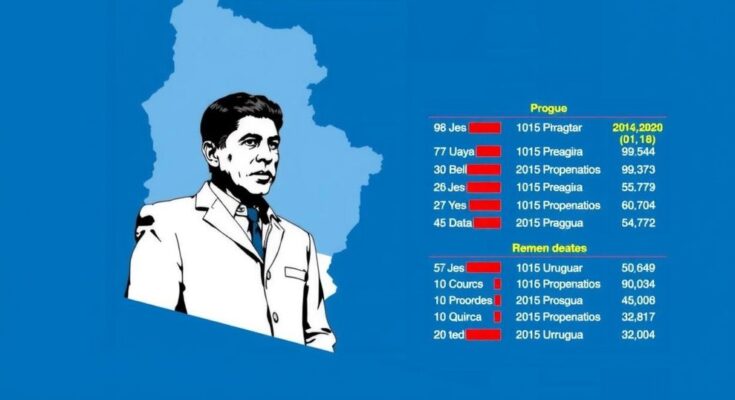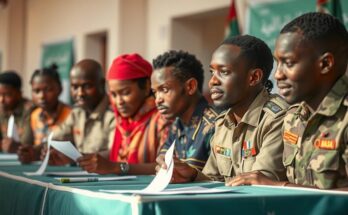Uruguay’s recent presidential election saw Yamandu Orsi and Alvaro Delgado emerge as the leading candidates, heading for a run-off on November 24. Orsi, from the Frente Amplio party, received 43.2 percent of the vote, followed by Delgado with 28 percent. Voter concerns focused on crime, with two recent referendums appearing to be rejected. The election reflects a departure from broader Latin American political trends, marking a significant moment in Uruguay’s governance.
Polling stations have closed in Uruguay, leading to forecasts of a likely run-off in the presidential election scheduled for November 24. The candidates poised to compete in this second round are Yamandu Orsi, a former history teacher representing the leftist Frente Amplio party, and Alvaro Delgado, a veterinarian from the center-right Partido Nacional. Current estimates indicate that Orsi garnered approximately 43.2 percent of the vote, placing him significantly ahead of Delgado, who received about 28 percent. A third candidate, Andres Ojeda, finished in third place with support ranging from 15.5 to 16 percent. This electoral outcome deviates from the dramatic shifts seen in other Latin American nations, showcasing a political landscape where major candidates display considerable overlap in their policies. Voter sentiment has largely been in favor of the current administration, despite ongoing concerns regarding crime, particularly violence associated with drug trafficking. While President Luis Lacalle Pou of the Partido Nacional enjoys a respectable approval rating of 50 percent, his coalition has struggled with addressing public safety issues amid rising criminal activities. In addition to the presidential vote, the electorate participated in two referendums concerning retirement age and police powers, both of which preliminary exit polls suggest have been rejected. Should Orsi triumph in the run-off, it would represent a significant shift to the left in Uruguay, following five years of conservative governance. Meanwhile, former president José “Pepe” Mujica, despite his frail health, made an appearance at the polls to lend support to Orsi’s campaign.
The political climate in Uruguay reflects a notable departure from the polarized right-left dynamics that have characterized many Latin American countries in recent years. With a population of 3.4 million, Uruguay’s latest electoral contest featured prominent candidates from diverse political backgrounds, specifically in the context of a ruling conservative coalition that has faced criticism despite raising employment and wages. The country’s electorate has expressed its concerns about crime, particularly in the context of drug-related violence, complicating the issues at stake in the elections. This election cycle also addresses broader societal issues, as evidenced by the referendums on retirement age and police authority that accompanied the presidential race.
The presidential race in Uruguay is headed toward a decisive run-off between Yamandu Orsi and Alvaro Delgado, signifying a potential shift in political alignment after five years of conservative governance. Voter dissatisfaction concerning crime, combined with critical referendum outcomes, underscores a complex socio-political landscape. The upcoming election will be pivotal in determining Uruguay’s future direction amid these challenges and voter sentiments.
Original Source: www.aljazeera.com


